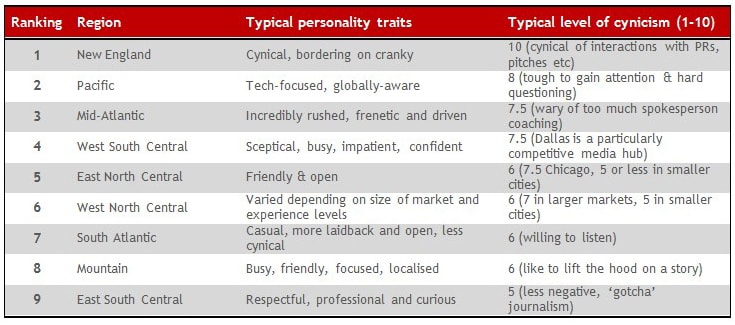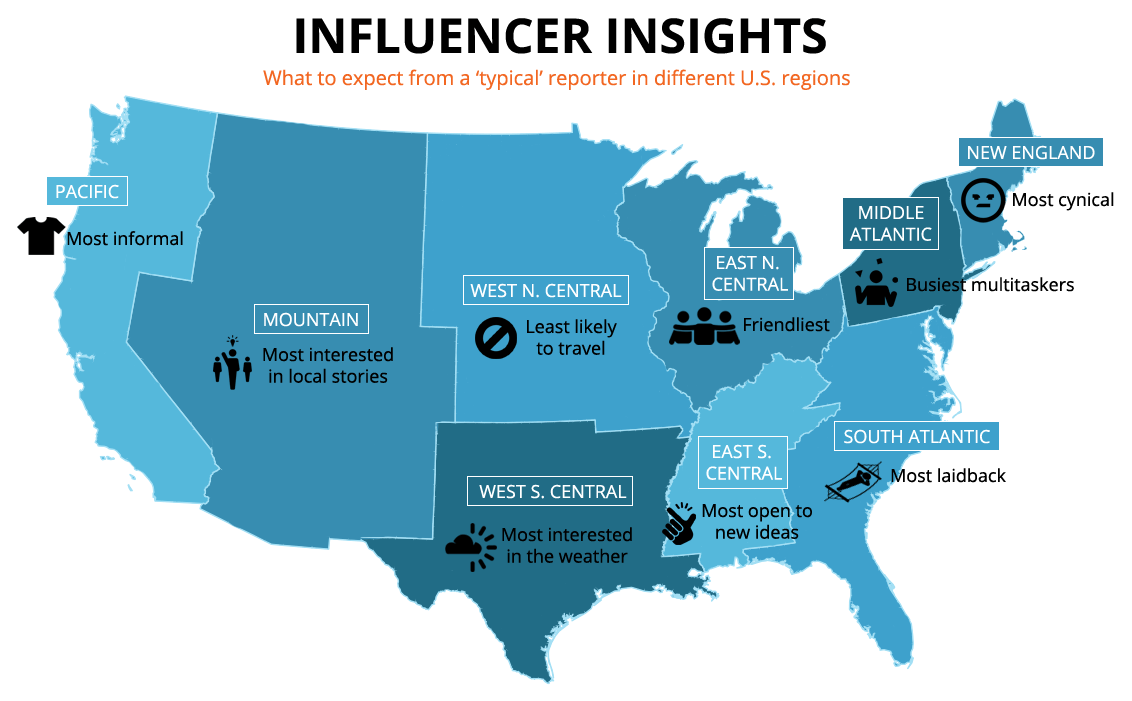British and European agency PRs have long bemoaned the geographical ignorance of some U.S. marketing directors. We’ve repeatedly complained that Europe is not a single, homogenous entity, but a complex, multi-faceted continent. We’ve explained that, due to the vast difference in culture, language and politics between European countries, a singular approach to PR is doomed to fail.
I thought that might be anachronistic, but it turns out it’s not. I’ve been asking people at PR networking events in London for the last six months, and many feel that some of our U.S. paymasters still don’t really understand the deep impact of regional idiosyncrasies on PR practice in Europe. And while it’s not as widespread as it used to be, it’s still a negative perception.
Then I started to think of the situation differently. It’s all very well to complain about the perceptions of a minority of our American cousins…but what about our own geographical ignorance? Do we understand the impact of regional differences in U.S. PR practice?
Well, no. No we don’t. Save for some vague stereotypes about West Coasters being more worldly-wise and Southerners taking a more relaxed approach, the European PR people I’ve spoken to tend to view the U.S. as a relatively homogenous PR market.
On speaking to a few U.S. partners, it became clear that there was quite a lot to learn about how PR differs between the regions, but there was nothing out there to help people understand. So, we asked agencies from nine different U.S. regions to help create a resource that could help companies in considering their North American PR approach.
The results were interesting and outline some real cultural differences and some clear similarities in basic PR practice between regions. The full findings are on our ‘U.S. Transcreation’ project website. We looked into 10 areas of interest – predominantly focused on media relations practice (a sensible place to start). Four aspects really stood out:
The Personality of the Media
I think I’m right in saying that we Brits have the most cynical press in the world. The way some PR people talk (myself included), it’s almost a source of national pride. But our grizzled hacks may have met their match in New England – where local PR experts describe journalists as typically ‘distrustful of PR efforts’ and ‘bordering on cranky’. They earn a cynicism rating of 10 out of 10.
Ranking of US divisions from most to least cynical

But in the East South Central region (including states like Alabama, Kentucky, Mississippi, and Tennessee), PR professionals and spokespeople can expect to meet more respectful and curious reporters, who rate just 5 out of 10 on the cynicism scale.
What was really fascinating was the way in which typical media personalities match some pretty familiar stereotypes:

- In New York (the Mid-Atlantic region) reporters are in a real rush
- In the Pacific region (West Coast), journalists take probably the most global view
- In the South Atlantic region (including Delaware, Florida, Georgia, Maryland, North Carolina, South Carolina, Virginia, Washington D.C., and West Virginia) media are more laid back and open to ideas and pitches
I know where I’d rather ply my trade.
Media Hospitality ‘Rules’
Having worked with some of the U.S. reporters based out of Europe – Bloomberg, INYT etc. – I’m conscious that there are fairly strict rules as to what can and cannot be accepted in terms of entertainment. But I was very surprised to hear that, in some parts of the U.S. influencer hospitality appears to be in terminal decline.
It’s probably at its most extreme in the West South Central region (which included Arkansas, Louisiana, Oklahoma, and Texas). Here, journalists reject the majority of hospitality invitations for fear of threatening their reputation for unbiased reporting. Entertainment is not the norm.
In two thirds of regions, journalists insist on paying for their own lunches and coffees at meetings. That’s very different from the hospitality ‘norms’ in Europe. Hospitality only seems acceptable and commonly practiced in the Pacific, East South Central and South Atlantic regions.
Regional Idiosyncrasies
For me, some of the most interesting things I’ve found out about PR in the U.S. are the curious localised habits and behaviours in various regions. I can’t really do them justice in short form, but here are three of my favourites:
In the South Atlantic region, journalists are incredibly sensitive to manners. It is considered extremely impolite to be pushy or aggressive in pitching. You should expect to work on ‘Southern Time’ – which can require extreme patience, especially when working with ‘hard’ news.
In New York, the agency we spoke with now actively counsels clients not to be offended when reporters – in mid interview flow – suddenly pick up their devices and start checking emails, social feeds etc. Apparently, they are listening.
In West North Central (which includes Iowa, Kansas, Minnesota, Missouri, Nebraska, North Dakota, and South Dakota) everything is about the local story. Reporters need hyper-local content, or a story – no matter what the significance – is unlikely to make the cut.
Views on News
I guess we’re all a bit parochial at heart, and this was perhaps the least surprising ‘insight’ from the project, but reporters across most U.S. regions need strong local angles for almost all content. They need to know how it affects their readers, and will avoid pitches and companies that fail to localise their stories.
National and international stories gain much more traction in major cities.
Not so different
It’s fair to say that, unless you work in a particular region or place every day, it’s unlikely you’ll understand exactly how it all ticks: The way reporters typically behave; the degree of scepticism they bring to each interaction; Approaches to hospitality; Culturally-informed behaviours. Even what constitutes news – they all change based on location. In Europe, Asia, Africa, the U.S., everywhere.
Yes, from an outsider’s perspective U.S. regions can seem remarkably similar. There aren’t really the pronounced differences we have in Europe: linguistic, currency, politics. But that’s not to say they’re not there, and marketers who ignore these idiosyncrasies risk failing in their efforts to communicate their messages to regional U.S. audiences.
Richard Fogg is Managing Director of London PR agency CCgroup.
PR Masterclass: The Intersection of PR and GEO
Wednesday 25th February, both virtual and in person tickets are available.
PR MasterclassIf you enjoyed this article, sign up for free to our twice weekly editorial alert.
We have six email alerts in total - covering ESG, internal comms, PR jobs and events. Enter your email address below to find out more:





